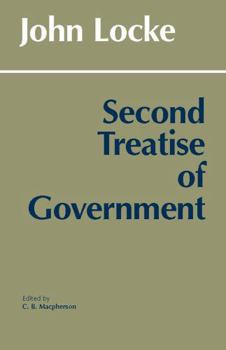Second Treatise of Government
(Part of the Great Books in Philosophy Series)
Select Format
Select Condition 
Book Overview
The Second Treatise is one of the most important political treatises ever written and one of the most far-reaching in its influence. In his provocative 15-page introduction to this edition, the late... This description may be from another edition of this product.
Format:Paperback
Language:English
ISBN:0915144867
ISBN13:9780915144860
Release Date:June 1980
Publisher:Hackett Publishing Company
Length:152 Pages
Weight:0.37 lbs.
Dimensions:0.3" x 5.4" x 8.5"
Customer Reviews
5 ratings
Classic Locke
Published by Thriftbooks.com User , 14 years ago
John Locke presents in "Second Treatise on Government," his theory of government which he believes is essential to promulgate "lest men fall into the dangerous belief that all government in the world is merely the product of force and violence." Locke defines political power as, "a right of making laws with penalties of death, and consequently all less penalties, for the regulating and preserving of property, and of employing the force of the community, in the execution of such laws, and in the defense of the common-wealth from foreign injury; and all this only for the public good." In order to explain political power, Locke presents his theory of the state of nature. To better explain his thoughts on the state of nature, he argues that, basically, in a state of nature there is also a state of equality. Locke asserts that all men are created equal, and therefore, no person should violate another person's rights. Further, Locke argues that if a person should ever harm another, since as we are all equal doing so would essentially be harming ones self. Liberty is a reccuring theme and prominently featured in Locke's writings. Locke asserts that liberty is the freedom to be governed exclusively by the laws of nature and by nothing and no one else. After reading this book, one might wonder what Locke's personal feelings were regarding such issues as the European slave trade and/ or the displacement and subsequent genocide of Native Americans Indians, which occurred during his lifetime.
John Locke's classic in handy format +plus bonus essay
Published by Thriftbooks.com User , 21 years ago
In his book, Second Treatise of Government, John Locke (1632 - 1704) writes that all humans are born equal with the same ability to reason for themselves, and because of this, government should have limitations to ensure that people are free from the arbitrary will of another person, according to the laws of nature. Government, in Locke's view, is a social contract between the people in control, and the people who submit to it. The editor of this edition, C. B. Macpherson, gives a little background and overview in his introduction to this book. He writes that the book "was directed against the principles of Sir Robert Filmer, whose books, asserting the divine authority of kings and denying any right of resistance, were thought by Locke and his fellow Whigs to be too influential among the gentry to be left unchallenged by those who held that resistance to an arbitrary monarch might be justified." (p. viii) Locke's book served as a philosophical justification for revolting against tyrannical monarchies in the Glorious Revolution and the American Revolution. His book was practically quoted in the Declaration of Independence.Locke lays out his basis for government on the foundation that people are able to reason. Because of this, people have inherent freedoms or natural rights. Though he believed in reason, Locke was an empiricist, meaning he believed that all knowledge of the world comes from what our senses tell us. The mind starts as a "tabula rasa", latin for an empty slate. As soon as we are born, we immediately begin learning ideas. Thus, all the material for our knowledge of the world comes to us through sensations. Nevertheless, Locke had an unshakable faith in human reason. He believed that people do learn what is right and wrong, regardless of what they choose to do. Locke believed that faith in God, certain moral norms and understanding consequences were inherent in human reason. So, even though people acquire everything they know about the world through the senses, they are able to think for themselves and reason at a higher level about what they learn.Locke presumed that there are universally recognized principles and that the consequences are practically scientific. He was greatly influenced by Isaac Newton (1647-1727) who wrote The Mathematical Principles of Natural Philosophy. Locke took the ideas that there were "natural laws" in science and tried to extend that to society.Natural laws, or rights, in Locke's view, are obvious and learned through human reasoning, and apply to everyone. They are also called "self-evident," which appears in The Declaration of Independence. All humans are created equal, and Locke bases this idea on the golden rule, that people are to do to others as they would have others do to them. Natural equality is the basis of the first and most important "natural law" which is to care for one another. (p. 9) Locke believes that with or without government, there were universal natural rights.Without government,
Good quality product!!!
Published by Thriftbooks.com User , 22 years ago
First, this is an unabridged version -- although it is wrongly listed as abridged. Second, this reading is clear, articulate and easy to follow. I have read the 2nd treatise many times before listening to this audio edition. The reader does a great job, staying faithful to the tone and cadence of this work. Ignore the review that gives this product a one-star. I hestitated when I saw it, but decided to buy this product anyway. I'm glad I did, as that review was terribly unjust.
The Rock America Was Founded On
Published by Thriftbooks.com User , 24 years ago
"The enjoyment of property that [man] has in this state [the state of nature] is very unsafe, very unsecure. This makes him willing to quit a condition, which, however free, is full of fears and continual dangers: and it is not without reason, that he seeks out, and is willing to join in society with others, who are already united, or have a mind to unite, for the mutual preservation of their lives, liberties and estates, which I call by the general name, property."Locke is one of the most influential philosophers of all time. In his Second Treatise, Locke lays the foundation for what has become modern western civilization. Locke's arguments are fully developed as he addresses his two greatest adversaries, Sir Robert Filmer and Thomas Hobbes. Though his critique of Filmer's `Patriarcha' is primarily addressed in the First Treatise and only summed up in the first chapter of the Second Treatise, his ideas of the `tabula rasa,' refuting the divine right of Kings is the foundation of the essay.Locke also gives a profound critique of Hobbes, as he sets forth the true `state of nature.' Locke's rational and logical conclusions make his ideas extremely easy to understand. This is a must read, since having a clear understanding of Locke's state of nature, state of war, property, power, political and civil societies, conquest, usurpation, and tyranny are fundamental to understanding the history and politics of America.
NOT Abridged!
Published by Thriftbooks.com User , 25 years ago
This audiocassette book is NOT abridged! To prove this, go to the publisher's website (Blackstone audiobooks).Some people, like myself, cannot, for whatever reason, read (paper) books, and there is, so far as I know, no other audio version of a Locke text available in the world. (There is a Knowledge Products two-tape set, and it is excellent, but it's ABOUT Locke; it is not the text on tape.) So I'm grateful to Blackstone for producing this. And, actually, I found it to be of very good quality.
Second Treatise of Government Mentions in Our Blog

How to Avoid Spending Hundreds on Textbooks You Probably Won't Read Anyway
Published by Eva • December 21, 2015
Winter term is eons away (thank the academic powers that be), but it's never too early to save.
Did you know Thrift Books sells textbooks? I didn't either. But now that I've figured it out, my life will never be the same. Actually, it will be exactly same; I'll just be richer.





